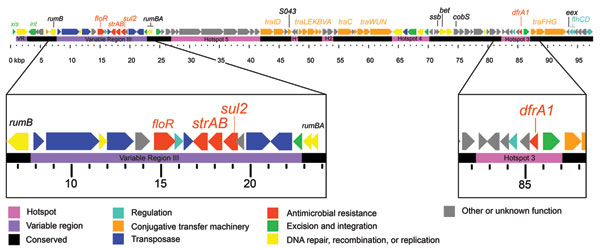Volume 17, Number 11—November 2011
THEME ISSUE
CHOLERA IN HAITI
Dispatch
Drug-Resistance Mechanisms in Vibrio cholerae O1 Outbreak Strain, Haiti, 2010
Figure 1

Figure 1. Genetic organization of the 2010 Haiti Vibrio cholerae O1 integrating conjugative element (ICE), ICEVchHai1. The ICE contained 97,915 bp and 95 open reading frames. Coding sequences were identified and manually annotated by using an in-house modified version of GenDBv2.2 (Center for Biotechnology at Bielefeld University, Bielefeld, Germany, www.cebitec.uni-bielefeld.de/groups/brf/software/gendb_info/index.html). Regions conserved among previously sequenced ICEs are indicated in black, regions of variability in purple, and previously identified hotspots of homologous recombination in pink. Conserved genes involved in conjugation are indicated in orange. Genes associated with antimicrobial drug resistance (floR [chloramphenicol], strAB [streptomycin], sul2 [sulfamethoxazole], and dfrA1 [trimethoprim]) are indicated in red. The complete sequence of ICEVchHai1 has been deposited into GenBank under accession no. JN648379.
1These authors contributed equally to this article.